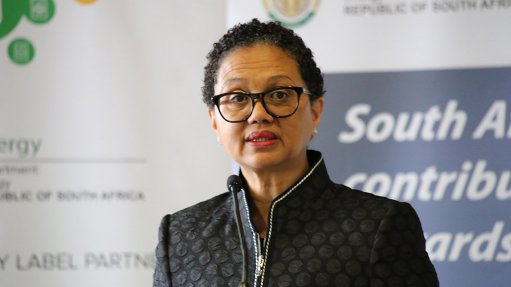
Energy Minister Tina Joemat-Pettersson
South Africa’s Department of Energy (DoE) has listed the names of several expert advisers whose services it has used over the past five years in relation to the country’s controversial nuclear procurement programme. However, the value of the various contracts was not immediately provided.
The list was released on Monday in response to media articles suggesting that individuals with strong ties to President Jacob Zuma were the beneficiaries of the first major nuclear-related contract awarded by the department.
The Mail & Guardian reported that a company trading as Empire Technology was awarded a R171-million contract for the procurement of the nuclear build programme management system. It noted that the company’s sole director is Shantan Reddy, the son of a long-time Zuma associate Vivian Reddy.
In a statement the DoE said that, as the Cabinet-designated procuring agency it was establishing a Programme Management Office, or PMO, with “the necessary resources including human resources; information technology and other resources”. This was being done in preparation for the procurement process, which would be initiated only once a request for proposals (RFP) was formally issued. Energy Minister Tina Joemat-Pettersson indicated in Parliament recently that the RFP would be issued by September 30.
The DoE added that, over the past five years, and in conjunction with other organs of State within the Energy Security Cabinet sub-structures, independent studies had been commissioned “to create a framework for the procurement decision and the preparation for the procurement of the nuclear new build programme”.
The independent transactional and/or expert advisers appointed over the period included:
- Engineering company Ingerop, which did investigations into the cost of nuclear power, the owner-operator and financing structures, as well as the economic impact of the localisation of the nuclear new build programme.
- Accounting and advisory group KPMG for the procurement framework.
- Consultancy Deloitte, which studied finance option model solutions and the deferred return on government investor approach.
- Nathan Gift Nhlapho Incorporated, which conducted a feasibility study on effective independence of the National Nuclear Regulator, as well as requirements, considerations and necessary arrangements by government in order for South Africa to accede to one of the International Atomic Energy Association’s Nuclear Liability Conventions.
- Zimkile Consulting for the development of a training programme for first responders to nuclear and radiological emergencies
- The University of Pretoria, which conducted a detailed financing model for the radioactive waste management fund.
- Mzansi Energy Solutions and Innovations for a feasibility study on the withdrawal of the safeguards function from South African Nuclear Energy Corporation.
- Mahlako-A-Phahla Investments, with subcontracting to Ledwaba Mazwai Attorneys and WorleyParsons, for a pre-procurement readiness assessment.
- And Empire Technology for the programme management system.
The DoE gave no indication as to the status of the various contracts, but insisted that the procurement of all the transactional advisers and services providers had been compliant and consistent with all applicable procurement prescripts. “The suggestion that there has been any bias or irregularity in the procurement of any of the services and resources is rejected.”
The DoE also went to great lengths to emphasise the rigour it was exercising in pursuing the nuclear new build programme in line with the South African Nuclear Energy Policy of 2008, the current Integrated Resource Plan (IRP) 2010, which provides for the roll-out of 9 600 MW of new nuclear capacity by 2030 and the National Development Plan (NDP).
The NDP called on government to conduct thorough investigations on different aspects of the nuclear new build programme before a procurement decision is taken, including costs, financing options, institutional arrangements, safety, environmental costs and benefits, localisation and employment opportunities, and uranium enrichment and fuel fabrication possibilities.
The DoE also reiterated that government had not entered into any deal or signed any contract for the procurement of the 9 600 MW of nuclear power, despite ongoing reports that such an agreement had been concluded with Rosatom, of Russia.
“Cabinet approved that the department must issue the RFP to the market and determine the final funding model as part of this process. The financial implications for the programme will be determined as the outcome of the RFP and resubmitted to Cabinet for consideration.”
It said all proceeding procurement processes formed part of feasibility and assessment processes needed by government to make an informed decision in finalising its considerations for a nuclear build.
“Government remains committed to a procurement process that is in line with the country’s legislation and policies,” the DoE said, reiterating Zuma’s earlier assertion that the country “will only procure nuclear on a scale and pace that the country can afford”.
Opposition to the proposed procurement of new nuclear capacity remains high, though, with legal action already under way and with critics questioning the wisdom of proceeding with a RFP ahead of any update to the IRP 2010, which is six years out of date.